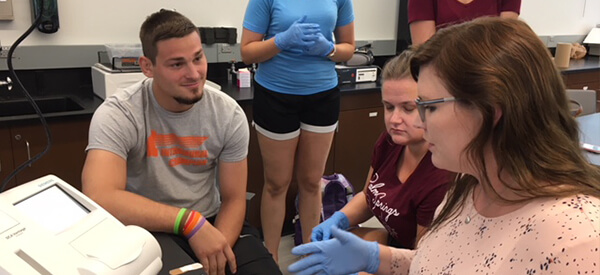Phil Welch receives grant for smartphone-based diabetes management study

Diabetes is a leading cause of morbidity and mortality in the United States costing $245 billion in 2012. Diabetes is the seventh leading cause of death in Ohio. Despite efforts by the American Diabetes Association and other health professionals to promote screening and prevent disease progression, access to quality diabetes management remains a problem among the underserved. The 2014 Lucas County Health Assessment estimates that 15% of Toledo adults have been diagnosed with diabetes compared to 13% in Ohio and 11% nationally. For adults age of 65 and income less that $25,000 prevalence increases to 24%. The medical staff at Community Care Free Medical Clinic (CCC) have estimated that up to 90% of the underserved patients they see have type 2 diabetes.
Researchers from Bowling Green State University (BGSU) and the University of Toledo Medical Clinic (UTMC), led by Phil Welch, BGSU’s assistant professor and graduate coordinator in public health, working in partnership with the CCC will help the clinic deliver quality health care to the underserved populations of Toledo. The team received a grant of $13,870 from the Stranahan Foundation to purchase A1c analyzer machines and supplies for use at the clinic. The Free Clinic serves an uninsured, under-insured, and resource-poor population. Many of the people who visit the clinic have type 2 diabetes. Welch, along with medical students from UTMC and BGSU graduate students in public health and nutrition, plan to run a pilot study from October 1, 2018 to September 30, 2019.
 “We will give the patients a smartphone app to track exercise, diet and blood glucose,” Welch said. “These apps have been shown to be effective in helping resource-rich people manage type 2 diabetes. We hope the app will also be useful for this resource-poor population.”
“We will give the patients a smartphone app to track exercise, diet and blood glucose,” Welch said. “These apps have been shown to be effective in helping resource-rich people manage type 2 diabetes. We hope the app will also be useful for this resource-poor population.”
The A1c test is the primary outcome measure. Welch and his team hope to see a significant reduction of A1c levels in those patients who use the smartphone app compared to a group who will use a placebo smartphone app. Patients will receive $150 each if they complete all phases of the one-year pilot study.
“The study will also provide future health care professionals the opportunity to work within interdisciplinary health teams and positively impact public health issues,” Welch said. “The work we do supports the Stranahan Foundation mission by helping people in desperate need of services gain access to health care and develop a sense of self-sufficiency and control over their health and future.”
Updated: 02/01/2021 11:49AM
